
ASEE CDEI Scholar Spotlight Series: Dr. Idalis Villanueva-Alarcón
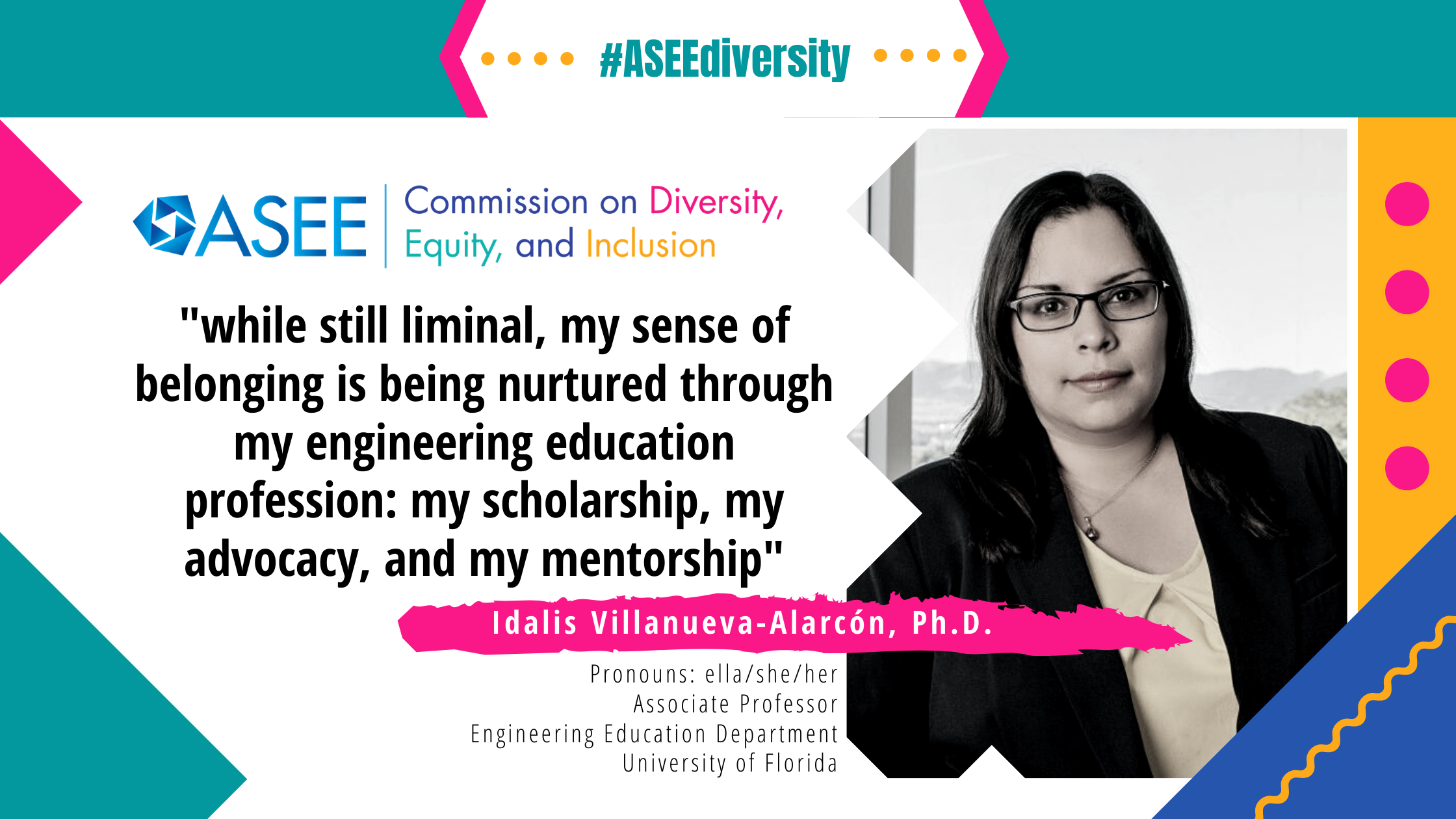
Dr. Idalis Villanueva-Alarcón: Using her experiences in liminality served as a lens for research scholarship that challenges normative ways of learning.
In this blog post we have the honor to hear the story of Dr. Idalis Villanueva-Alarcón (ella/she/her). For the past 9 years, Dr. Villanueva-Alarcón has worked on several engineering education projects inspired by her experiences in engineering to improve outcomes for minoritized groups in engineering using mixed-and multi-modal methods approaches. She currently is an Associate Professor in the Engineering Education Department at the University of Florida. In 2019, she received the Presidential Early Career Award for Scientists and Engineers (PECASE) award for her NSF CAREER project on hidden curriculum in engineering. Dr. Idalis Villanueva-Alarcón has a B.S. degree in Chemical Engineering from the University of Puerto Rico at Mayagüez and a M.S. and Ph.D. degree in Chemical and Biological Engineering from the University of Colorado-Boulder.
Soon after, she completed her postdoctoral fellowship from the National Institutes of Health in Analytical Cell Biology in Bethesda, Maryland and worked as a lecturer for 2 years before transitioning to a tenure-track position in engineering education. Her experiences as a first-generation college student and engineer, bilingual, Latina, woman of color, introvert, and mother has shaped the lens and approaches that she uses in her research. She hopes that her work will not only challenge normative ways of knowing but also research scholarship.
Besides the candid perspectives of Dr. Villanueva-Alarcón, you will learn in this post what it means to be in a liminal state. The Merriam-Webster dictionary defines liminal as “relating to, or being an intermediate state, phase, or condition.” I am sure that her story will resonate with many of you. Enjoy!
At the end of this post, don’t miss out on the opportunity to connect with our scholar and learn more about the ASEE CDEI‘s efforts.
ASEE CDEI Communications Committee Volunteers:
- Introduction, editor and webmaster: Sindia M. Rivera-Jiménez, Ph.D., University of Florida (Twitter)
- Editors: Susan Boerchers, Lafayette College; Tershia Pinder-Grover, University of Michigan, Homero Murzi (Twitter), Virginia Tech, and Elizabeth Litzler, University of Washington.
Scholar Interview
Q: Can you tell us your story of belongingness?
My story of belongingness is incomplete, at most. It is a journey that I am still walking alongside the field of engineering. I think part of the reason is because I have a liminal engineering identity in a field that is caught between two versions of itself (one of technical prowess and one of service to society). The other reason may be my multiple intersectional identities as a first-generation, Latina, woman, mother, and introvert. Being the first in my family to go to college has been a journey of emotional and mental re-discovery and re-fragmentation. You see, I wasn’t fully supported in my decision to pursue engineering. I still remember some of my family members stating that women should not pursue such a degree and that my duty was to my husband and children. For others, my introvertedness was viewed as a weakness and as someone who is “not able to make it in engineering,” as “a person lost without a cause,” or as a “person whom they had to cut (me)…a loss for engineering education and research”. Sadly, I heard this constantly throughout my undergraduate, graduate, and professional years. These hidden and sometimes covert messages have fragmented my sense of belonging within engineering. And yet, I have discovered great power in this brokenness. I have learned that I can exist and thrive in this liminal field, as empathetic, strong, and passionate about my advocacy in engineering.
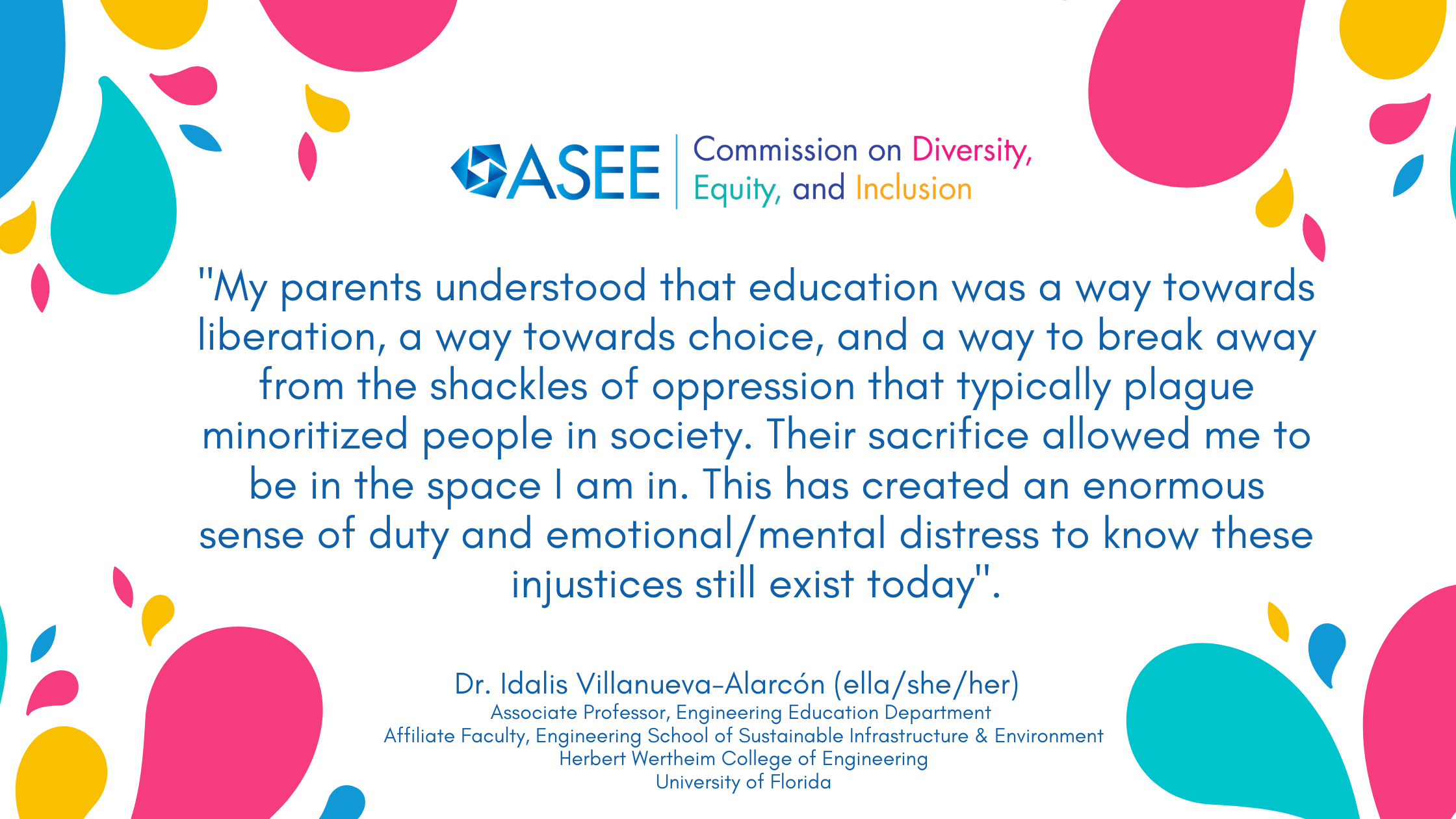
The liminality and struggles in these third spaces have also served as a motivation to others such as family members, friends, and students who have seen my pathway not as an easy one but one that is authentically broken and powerful, a person that rose from the ashes. When I was growing up on the island of Puerto Rico, I lived near the ocean. While some may see this as glamorous, the reality is another. Where I was raised, the community was well below the poverty line, and drugs and prostitution was the only way to survive. I grew up seeing many of my friends become the victims or killed as result of a system of power, privilege, and oppression. I was one of the lucky ones. My parents understood that education was a way towards liberation, a way towards choice, and a way to break away from the shackles of oppression that typically plague minoritized people in society. Their sacrifice allowed me to be in the space I am in. This has created an enormous sense of duty and emotional/mental distress to know these injustices still exist today.
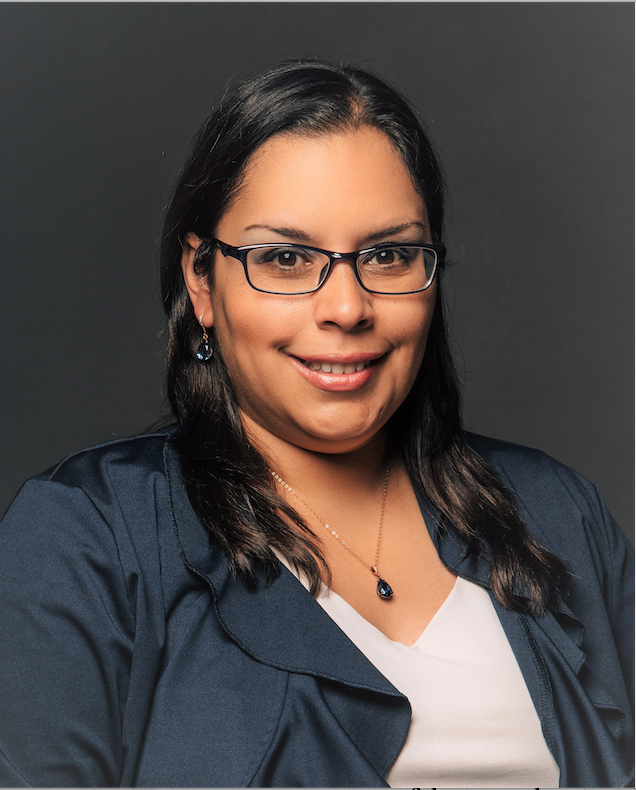
Dr. Idalis Villanueva-Alarcón (ella/she/her) Associate Professor, Engineering Education Department
Affiliate Faculty, Engineering School of Sustainable Infrastructure & Environment
Herbert Wertheim College of Engineering
University of Florida
When I decided to pursue engineering, it was through the encouragement of a high school teacher who saw potential in my chemistry classes and proposed the idea of blending chemistry with engineering. However, my walk with chemical engineering was not easy. Suffering from health, financial, and personal losses of life during my undergraduate engineering education compounded with sexism, harassment, classism, and, more predominantly, apathy from many of my professors left in me a distaste for the profession of engineering. This struggle continued with me all the way to my grad school, where I became the first Puerto Rican to graduate with an M.S. and Ph.D. in engineering. Despite my successes, I still wanted to leave engineering because I sensed that I only fit in engineering in a liminal state. At the same time, I felt the pressure to become an agent of representation for my people and culture, my island and my family. So, after my Ph.D., I left engineering and did a postdoc in science at a national lab. There, I discovered two things: (a) the diversity, equity, and inclusion issues present for intersectional groups are the same across STEM fields because it is a systemic problem, and (b) that despite my struggles with engineering, I had made it. I had become one of the few minoritized women to persist, and this was something that couldn’t be put to waste. Thus, while still liminal, my sense of belonging is being nurtured through my engineering education profession: my scholarship, my advocacy, and my mentorship. Each center me to find my belonging and my authentic self. At the same time, I continue to navigate third spaces while I am helping to equip the next generation of engineers to pursue this field with open eyes and a passion for transforming liminal spaces into authentic places of growth and persistence.
Q: What is your understanding of Diversity, Equity, and Inclusion (DEI), and why is it important to what you do?
As I expressed before, my struggles with engineering were at the intersectionality of my multiple identities and within liminal spaces of belonging. As an intersectional individual in engineering, DEI is at the center of my work.
More specifically, when I learned about hidden curriculum, I was blown away. This theoretical framework helped me to understand my struggles with engineering education and research. Hidden curriculum constitutes the unwritten, unintentional, and often implicit or explicit messages transmitted to people in learning and working environments about their sense of belonging in their field and pursuits. In 2017, I got an NSF CAREER award to explore hidden curriculum in engineering and develop pathways to understand how diverse people (e.g., Latinx, Black, LGBTQ+, first-generation, etc.) advocate for themselves and what factors prevent them from doing so. From this work, I am discovering how to develop individualized advocacy mentoring models to equip different individuals in engineering to speak up about their needs and about the inequities that may be present in their learning or other issues that may be affecting them mentally, cognitively, and spiritually.
The hidden curriculum in engineering has allowed me to start conversations with faculty, undergraduate students, and graduate students about ways to create messages that enable an environment where multiple identities are embraced. It always pleases me when I hear stories of people standing up for themselves in engineering and speaking up about their needs, interests, and how hidden curriculum and an increased awareness of such has equipped them with a new set of strategies that strengthen their voice and self-advocacy in their immediate environment.

Dr. Villanueva-Alarcón with Latinx undergraduate students at the Society of Hispanic Professional Engineers Annual Conference
Q:What are your current initiatives towards DEI work?
I have been traveling and presenting, either through research talks or professional development sessions, on topics related to hidden curriculum, inclusive and accessible teaching, mentoring, and DEI in science and engineering. I have been part of IEEE Frontiers in Education, ASEE Women in Engineering, and SHPE committees to support the increased representation of minoritized groups in engineering beyond the tokenistic roles that are typically associated with service and outreach. I also mentor many students and faculty to find their voice and their way, even if they are not within academic environments. Not all roads lead to academia!
You can also check out our most recent and past publications under the NSF funded project Advocating for Engineering through Hidden Curricula.
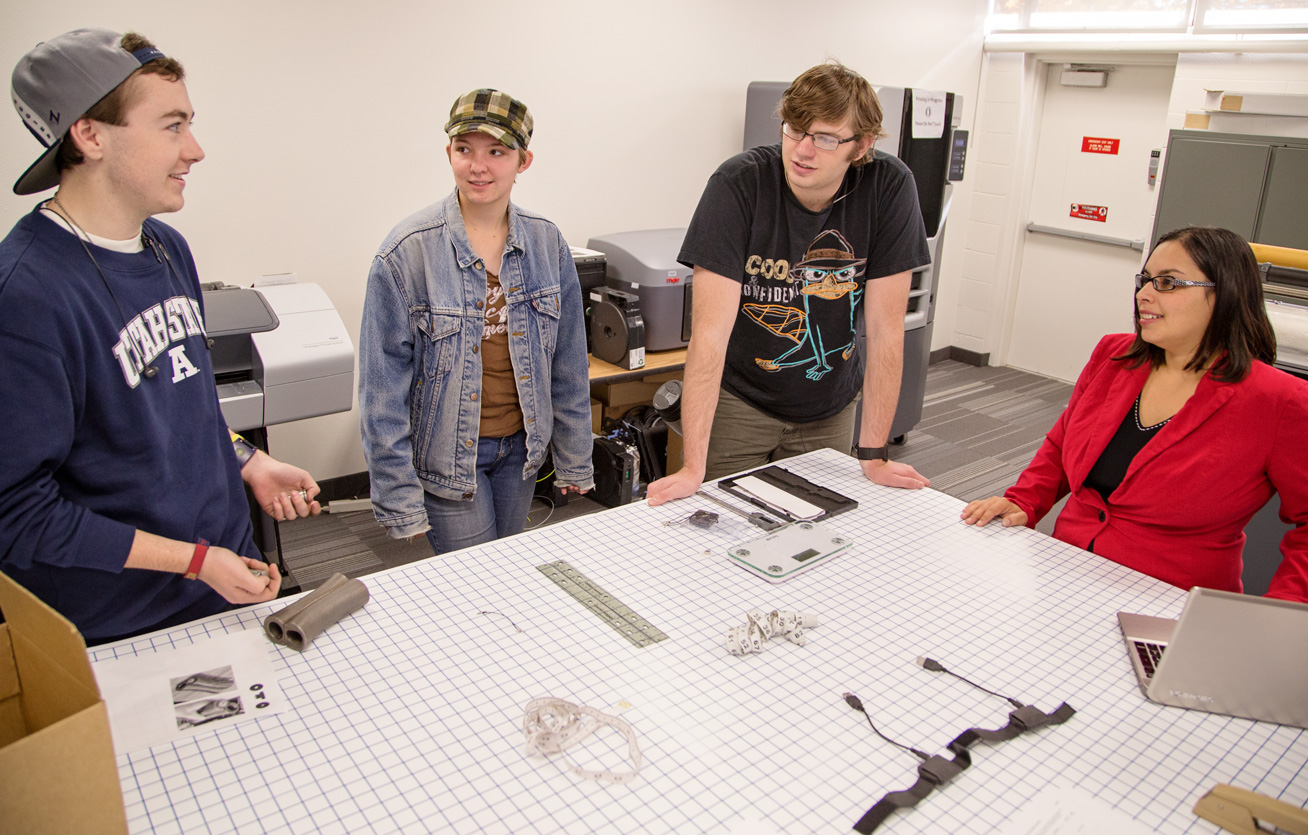
Dr. Villanueva-Alarcón with undergraduates working on their service-learning engineering design projects
Q: What do you see as the next steps for your DEI work?
Lately, I have been very interested in re-imaging research methodologies in engineering education through the lens of intersectionality and critical theoretical frameworks. I think we have plenty of research showing similar DEI issues, but I feel that these methods and techniques were designed by majority groups that carried one ideology and way of knowing and being. These dominant approaches to research leave out the contributions of many scholars of color and other minoritized groups. If we can fundamentally change how research is done, I believe we can create more spaces for scholars of multiple identities to have a voice in this space and create policy that in addition to recruit DEI scholars also put in place significant effort to retain and support them.
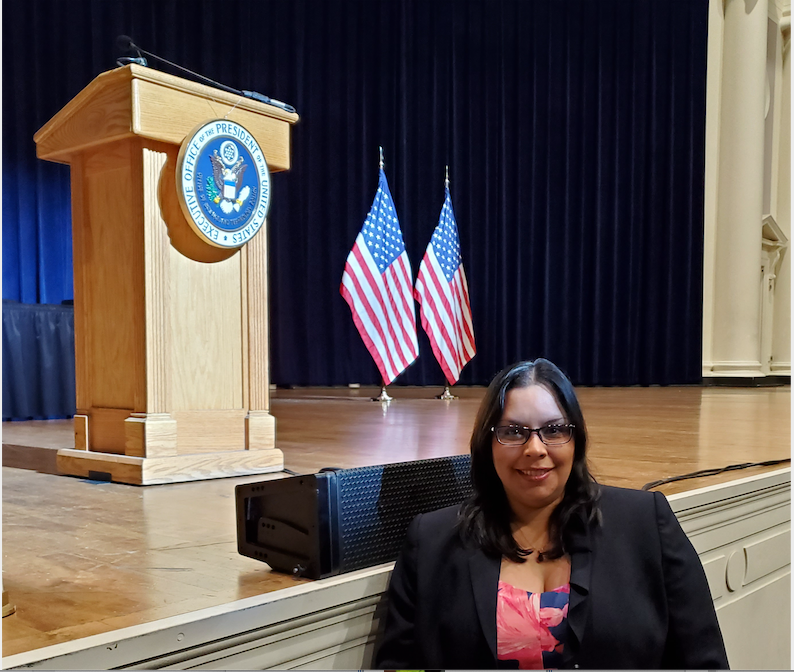
Dr. Villanueva-Alarcón at the 2019 PECASE Ceremony
Q: What recommendations do you have for engineering educators to start incorporating social justice in their classrooms?
From a hidden curriculum-approach, I would encourage engineering educators to reflect critically about the assumptions they may be making about their students and their expectations for their students. Allow students to be co-contributors to their learning and level the power imbalances between instructors (positions of authority) and students. Students have a lot to contribute to, and social justice initiatives can help decolonize existing teaching practices that enact the status quo and norms that deter many from persisting.
Q: What resource can you recommend to people who want to learn more about DEI in your field?
Villanueva, M. Di Stefano, L. Gelles, K. Youmans, & A. Hunt. (2020). Development and Assessment of a Vignette Survey Instrument to Identify Responses due to Hidden Curriculum among Engineering Students and Faculty. International Journal of Engineering Education, 36 (5), p. 1549–1569.
Gelles, I. Villanueva, M. Di Stefano. (2019). “Mentoring is ethical, right?”: Women graduate students & faculty in science & engineering speak out. International Journal of Gender, Science, & Technology, Special Issue in Gender & Intersectionality in Engineering, 11 (1), 108-133; http://genderandset.open.ac.uk/index.php/genderandset/article/view/578/1041.
Gelles, K. Youmans, I. Villanueva & M. Di Stefano. (2019). Hidden Curriculum Advocacy and Resources for Graduate Students in Engineering. CONECD Conference, Crystal City, VA, April 14-17, 2019
Mejia, R. Revelo, I. Villanueva, & J. Mejia. (2018). Critical theoretical frameworks in engineering education: an anti-deficit and liberative approach. Education Sciences, 8 (4), 158: 1-13; doi:10.3390/educsci8040158.
Other resources: Advocating for Engineering through Hidden Curricula.
Recommended ASEE PEER paper from our scholar:
Villanueva, I., & Gelles, L. A., & Di Stefano, M., & Smith, B., & Tull, R. G., & Lord, S. M., & Benson, L., & Hunt, A. T., & Riley, D. M., & Ryan, G. W. (2018, June), What Does Hidden Curriculum in Engineering Look Like and How Can It Be Explored? Paper presented at 2018 ASEE Annual Conference & Exposition , Salt Lake City, Utah. 10.18260/1-2–31234
This work in progress paper describes the initial stages of a project which aims to characterize the mechanisms of hidden curriculum (HC) in engineering and identify methods for exploring this phenomenon. To effectively study the complex nature of HC, this work brings together researchers with a range of expertise (sociology, engineering education, engineering, statistics, policy analysis, curriculum and instruction) to develop a holistic approach to explore HC in engineering.
Find more articles on ASEE Peer for this scholar: Villanueva-Alarcón
Connect with our scholar:
- Website(s): Professional Site, Email
- Social Media: Twitter, LinkedIn
Getting involved with CDEI
- If you want to recommend someone for our Spotlight series click here.
- Check out website Highlights:
- Resources
- Past Blogs and Events
- Compilation of Newsletters and Reports
- Connect with the committee:
- Become a Friend of the Committee
- Follow us and tag us on Twitter
- Become a volunteer on our Communications Committee! We are always looking for people that want to share or improve their writing and leadership skills.
Check out other Spotlight Scholars:
- Dr. Homero Murzi: Creating culturally responsive environments by focusing on the voices of our engineering students (September, 2020)
- Dr. Tony E. Butterfield: Empowering faculty and students to create an inclusive environment for the LGBTQ+ community (October, 2020)
- Dr. Carlotta A. Berry: From trailblazer to building a strong community and network to foster allyship and confidence among engineering students (February, 2021)
- Dr. Lindsay Soh: From actively maintaining a sense of belongingness to helping others develop their own (March, 2021)
